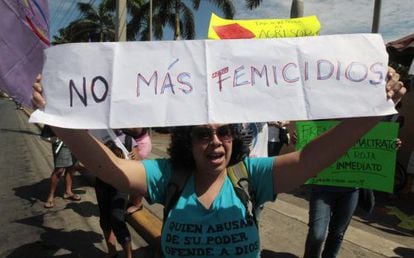“Nicaragua is one of Latin America’s safest countries — but not for women”
The nation of six million reported 46 female murder victims in the first three months of 2014


La Prensa, the biggest-selling newspaper in Nicaragua, put a horrifying photograph on its Wednesday front page: a woman lying in a pool of blood on her bedroom floor. There was blood splattered on the walls and soaking up the white sheet on her bed. Next to her on the page, a headline in large print read: “Another victim of femicide.” She is the 46th woman to murdered this year in a country of only six million inhabitants.
Carmen Martínez López had just turned 25 years old. Her partner, Walter Galán, murdered her using a machete because he could not get over her decision to end their relationship. One of the wounds was 25 centimeters wide, such was his rage. “They say Nicaragua is one of the safest countries in Latin America but not for women,” said Magali Quintana, one of the coordinators of Católicas por el Derecho a Decidir, an organization that keeps an updated registry of female murders in this small yet troubled country.
The killing took place in La Paz Centro, a small town on the Pacific coast where nothing noteworthy had ever happened. It lies on the way between Managua and León, the nation’s largest cities. Women’s organizations say the murder follows an alarming trend: ever younger victims killed by young men – their partners in most cases. The aggressors rarely get punished. “Most perpetrators are fugitives from justice,” Quintana says. Carmen’s partner, Walter, fled after leaving her lying in a pool of blood in the bedroom.
Nicaragua’s Women’s Network Against Violence reported 72 murders of women last year, 85 in 2012 and 63 in 2011
Last year, Nicaragua passed a law known as “Ley 779.” At first, it was expected to punish those who killed women. But the measure infuriated conservatives, including some from the Catholic Church, who said it could affect families and become a way to punish men. The law condemned those who committed violence against women to 30 years in prison. The controversy was so great that high-ranking church officials issued public statements. “We have said repeatedly that the Mark of the Devil is no longer 666,” said Abelardo Mata, bishop of the diocese of Estelí in northern Nicaragua. “It is now 779, because this law is destroying families. How many times have people who accused a husband, uncle or cousin out of anger or revenge then said – once the storm had passed – that they had been too hard on them and so decided to drop the case?”
The National Assembly finally approved the measure with one condition that came as a complete shock to women’s groups: mediation, a legal injunction that requires women to negotiate with their aggressors after denouncing them. “Mediating is an instrument of death for women,” Quintana said. “The women’s police stations – which depend on the national police corps – are pushing for women to enter a process that leads to their death.”
Activist groups say the new law has not helped stem the tide of violence against women. The Women’s Network Against Violence reported 72 murders of women last year, 85 in 2012 and 63 in 2011. Reyna Rodríguez, the national coordinator of the organization, says the trend will be hard to stop. “Every three days a woman is murdered in Nicaragua,” she tells EL PAÍS. “The law is important but there is no effective intervention because the state does not guarantee the funds to implement the measure.” According to the reports, six of the women killed so far this year were teenagers. Six more were between the ages of 18 and 20. The perpetrators are also very young. The groups fighting against this issue say this fact points to a violent tendency and deeply rooted sexism in Nicaraguan society.
Every three days a woman is murdered in Nicaragua”
Rodríguez says the authorities foster this kind of violence because they allow it to go unpunished: “The state has an authoritarian style, a vertical organization that is absolutist, exclusive, and indifferent to the femicides.” President Daniel Ortega should allocate a portion of the budget to a campaign to raise consciousness and prevent gender-based violence, she adds.
The authorities’ passive response to these statistics frustrates her. “If a daughter of Rosario Murillo’s [the first lady and chief spokesperson of the Ortega administration] or Alba Luz Ramos’ [president of the Supreme Court] were attacked, the entire country would be on red alert. They would deploy 20,000 police officers. But, since the women who have been killed were not the children of great figures, since they were ordinary women, the state’s response is shameful.”
Translation: Dyane Jean François










































